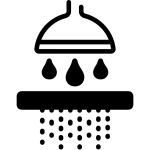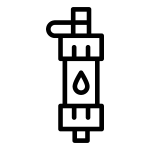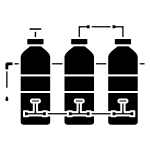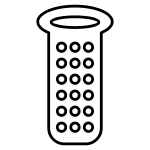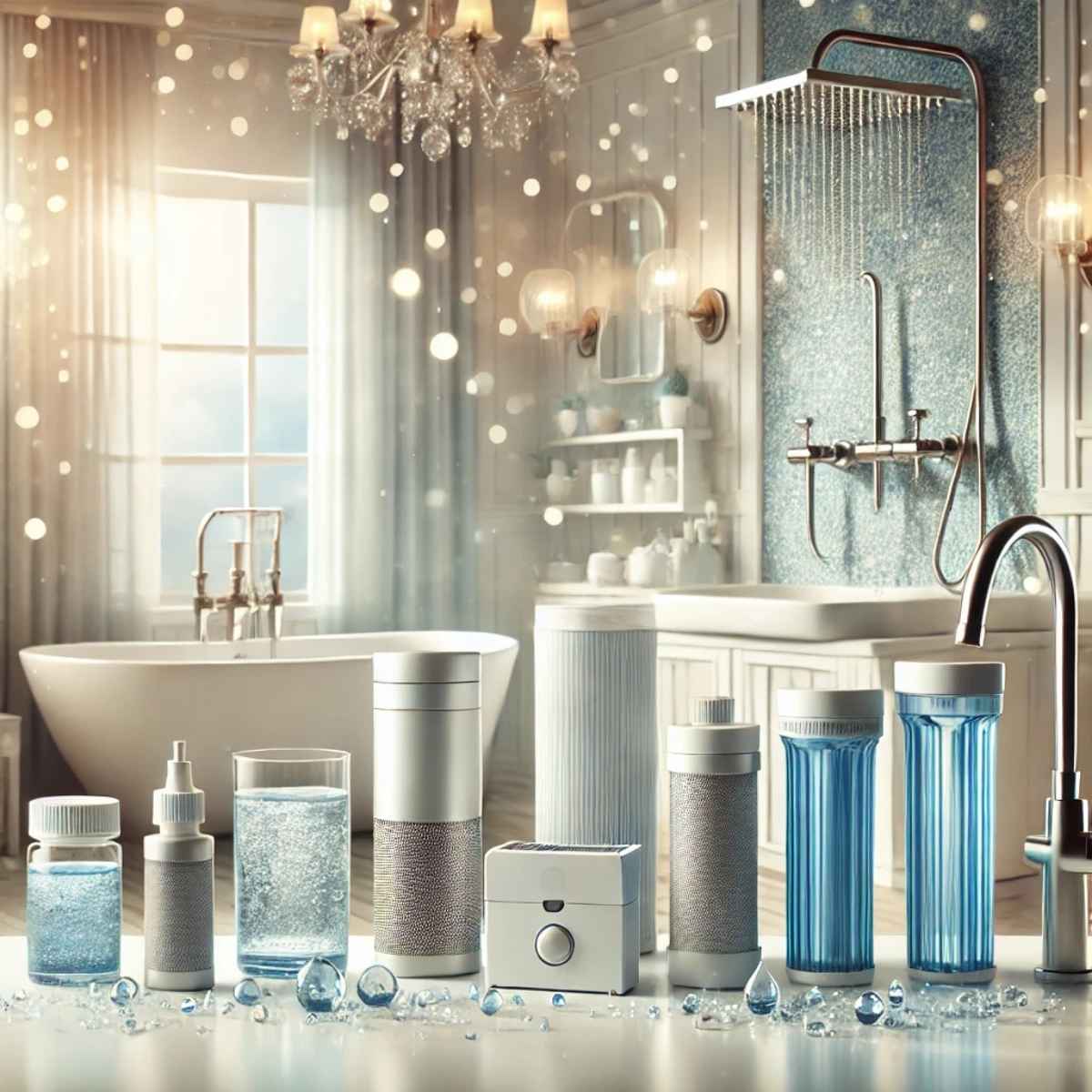Clean water is essential for every household. Whether it’s for drinking, cooking, bathing, or washing clothes, we all want water that is safe, clean, and healthy. However, water that comes into your home can contain a variety of contaminants, minerals, and impurities that affect its quality. Two of the most popular solutions to improve household water quality are whole house water filters and water softeners. But which one is right for you?
In this guide, we’ll dive deep into the whole house water filter vs water softener debate, break down their differences, benefits, drawbacks, and help you decide which one (or both) you actually need for your home.
What Is a Whole House Water Filter?
A whole house water filter is a filtration system installed at the main water line, where water first enters your home. It ensures that every tap, shower, and appliance in your house receives filtered water.
What Does It Do?
Whole house water filters remove:
- Sediment
- Chlorine and chloramines
- Heavy metals (like lead or mercury)
- Pesticides and herbicides
- Volatile organic compounds (VOCs)
- Bacteria and viruses (depending on the filter)
Key Benefits:
- Clean water from every faucet
- Better tasting and smelling water
- Protects plumbing and appliances from sediment build-up
- Healthier showers and baths
- Removes harmful contaminants that could affect your health
Who Should Consider One?
Anyone who wants clean, safe water throughout the entire home, especially if they rely on well water or live in areas with known water quality issues.
What Is a Water Softener?
A water softener is designed to remove hard water minerals, primarily calcium and magnesium, from your water supply. These minerals cause scale buildup, which can damage your plumbing, reduce appliance lifespan, and affect your skin and hair.
How Does It Work?
Water softeners typically use an ion exchange process, replacing calcium and magnesium ions with sodium or potassium ions, making the water “soft.”
Key Benefits:
- Prevents limescale buildup on pipes and appliances
- Extends the life of water heaters, dishwashers, and washing machines
- Makes soaps and shampoos more effective
- Leaves skin feeling softer and smoother
- Reduces spots on dishes and glassware
Who Should Consider One?
If you live in an area with hard water, a water softener can drastically improve your home’s water quality and reduce maintenance costs over time.
Whole House Water Filter vs Water Softener: Key Differences
| Feature | Whole House Water Filter | Water Softener |
|---|---|---|
| Main Purpose | Remove contaminants (chemicals, sediment, etc.) | Remove hardness minerals (calcium, magnesium) |
| Water Quality Concern | Health and safety | Plumbing and appliance protection |
| Water Taste Improvement | Yes | No (doesn’t remove chemicals) |
| Skin & Hair Benefits | Some (if chlorine is removed) | Yes (softer water = softer skin/hair) |
| Technology Used | Carbon filters, sediment filters, UV, etc. | Ion exchange (salt or potassium) |
| Best For | Health-conscious households | Hard water problems |
When Do You Need a Whole House Water Filter?
Here are a few signs that your home could benefit from a whole house water filtration system:
1. You’re Concerned About Water Contaminants
If your water smells like chlorine or tastes off, it may contain chemical disinfectants or impurities. A whole house filter removes these contaminants at the point of entry.
2. You Use Well Water
Well water is prone to sediment, bacteria, and heavy metals. Filtration is essential to make it safe for use.
3. Your Skin Gets Irritated After Showers
Chlorine and other contaminants can dry out or irritate sensitive skin. Whole house filters eliminate these substances before they reach your skin.
4. You Want Peace of Mind
A whole house system ensures that every drop of water you use is filtered — not just your drinking water.
When Do You Need a Water Softener?
You might need a water softener if:
1. You See White Buildup Around Faucets or Showerheads
This is a tell-tale sign of hard water. A water softener removes the minerals causing this.
2. Your Skin and Hair Feel Dry or Sticky After Showering
Hard water can leave a film on your skin and prevent soap from rinsing properly.
3. Your Appliances Wear Out Quickly
Hard water causes scale build-up, which can reduce appliance efficiency and life span.
4. Your Laundry Feels Rough or Faded
Soft water helps your clothes come out cleaner, brighter, and softer.
Can You Use Both?
Absolutely. Many households benefit from using both a whole house water filter and a water softener.
- The filter removes harmful contaminants.
- The softener removes hardness minerals.
Together, they offer complete water quality protection, ensuring the water you drink, cook with, bathe in, and use in your appliances is both clean and gentle.
Typical Setup:
- Whole House Water Filter is installed first, so it removes large particles and chemicals.
- Water Softener is installed after, treating the already-cleaned water to remove hardness.
Installation & Maintenance
Whole House Water Filter:
- Installation: Usually done at the main water line.
- Maintenance: Replace filters every 3-12 months (depending on system).
- Professional Help: Recommended for installation.
Water Softener:
- Installation: Typically installed near the water heater.
- Maintenance: Refill salt or potassium regularly.
- Cleaning: Occasional tank cleaning required.
Both systems are relatively low maintenance, but it’s important to follow the manufacturer’s guidelines for optimal performance.
Cost Comparison
| Feature | Whole House Water Filter | Water Softener |
|---|---|---|
| Initial Cost | $300 – $2,500+ | $400 – $2,000+ |
| Installation | $200 – $600 | $150 – $500 |
| Annual Maintenance | $50 – $300 | $60 – $180 |
| Lifespan | 5-10 years | 10-15 years |
Prices can vary depending on the brand, capacity, features, and local labor rates.
How to Choose the Right System for Your Home
Step 1: Test Your Water
Before choosing a system, get a water test to identify your specific problems — hard water, chlorine, bacteria, lead, etc.
Step 2: Identify Your Goals
- Want to improve taste, smell, and safety? ➤ Go for a whole house water filter.
- Tired of scale buildup and dry skin? ➤ Go for a water softener.
- Want it all? ➤ Use both systems in tandem.
Step 3: Check Your Budget
Factor in not just initial costs, but long-term maintenance and water quality benefits.
Step 4: Choose a Trusted Brand
At Cuoll, we offer high-quality water filters, water softeners, and bathtubs to help you build a healthier and more luxurious home. Browse our collection of whole house water filters and water softeners today to find the perfect fit for your household.
Final Verdict
Whole House Water Filter vs Water Softener – Which One Wins?
They don’t compete — they complement each other.
- If your primary concern is health and safety, go with a whole house water filter.
- If your concern is plumbing, appliance longevity, or dry skin, go with a water softener.
- Want the best of both worlds? Combine them for maximum water quality.
At Cuoll, we understand that every home has unique water needs. That’s why we offer a range of top-rated products to help you enjoy cleaner, softer, and healthier water. Whether you’re dealing with hard water, chlorine, sediment, or other water issues — we’ve got the solution for you.
Ready to Upgrade Your Water?
Shop our premium selection of whole house water filters, water softeners, and more on Cuoll and take the first step toward better water for your home today.


